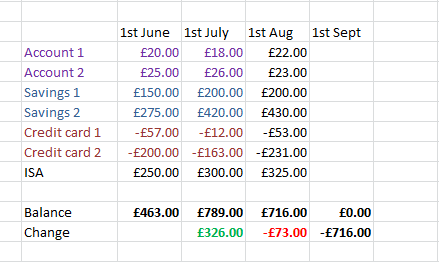We’d like to remind Forumites to please avoid political debate on the Forum.
This is to keep it a safe and useful space for MoneySaving discussions. Threads that are – or become – political in nature may be removed in line with the Forum’s rules. Thank you for your understanding.
📨 Have you signed up to the Forum's new Email Digest yet? Get a selection of trending threads sent straight to your inbox daily, weekly or monthly!
Advice with budgeting spreadsheet. Met a bit of an issue.
Comments
-
I don't budget per se, but I do track every penny I spend and am very careful. Here's how I keep a record:
- I have an Excel workbook
- I have a separate sheet for each month, dating back (now) to 2014
- I download my statements from my accounts - I have one main current account and three main credit cards
- The top row of each tab (i.e. each month) is 'savings transfers'. This does what it says and means I can see what I've saved each month and separate it from other outgoings
- Everything else is categorised (and colour coded) in one of 5 categories: direct debits; food; petrol; home. I occasionally withdraw cash, so that's the final category
- I get paid once each month so I suppose that's actually the sixth category and colour
- I can watch my spending in those categories and make sure that they are equal to or less than what I know I will be paid at the end of the month
I also link these to other sheets where I can see a record for each of those categories for each month and have graphs showing the average.
Oh, and I do have one other category - 'special' - for one off purchases or annual things that would skew 'home' otherwise - so, the annual car service and when I had to replace my boiler a little while ago.0 -
I used to use predetermined budget sheets but had similar issues so eventually designed my own using different ideas i found on YouTube.
It’s very simplistic but is what I need and I also have different tabs to keep track of things like savings
2 -
I take a similar approach. All my current/savings accounts and ISAs (initial/paid in value only - I don't track market variations) are positive, and any credit cards are negative. I assign categories to each transaction (Bills, Food, Car, Pets, Sprogs, etc). Transactions between accounts (Current to Savings for example) do not need a category. Each month end, I sum the net worth and store that separately, and I sum up the different categories so I can see where it has all gone. I store that each month too - so I can see if Car is going up or down in time. So it's more retrospective analysis (versus budget), but it would be easy to use the same approach to track budget for Food (say). I have this data for 30+ years, so interesting to see the trends.I’m a Forum Ambassador and I support the Forum Team on the Credit Cards, Savings & investments, and Budgeting & Bank Accounts boards. If you need any help on these boards, do let me know. Please note that Ambassadors are not moderators. Any posts you spot in breach of the Forum Rules should be reported via the report button, or by emailing forumteam@moneysavingexpert.com.
All views are my own and not the official line of MoneySavingExpert.0 -
I would say that's identical to how I am currently tracking my accounts, to a degree (so therefore not exactly identical, but let's not be particularJami74 said:
In the beginning I got myself into lots of debt on my spreadsheet when I still actually had money in my accounts. I did try to use a Google sheets template that I found online and initially it went well but then I got into similar troubles with it.RG2015 said:My spreadsheet shows payments to my own accounts as transfers so my balance remains positive.
I gave up trying to work out how much I had 'saved' each month but rather worked on the increase (or decrease) in my overall balances each month. Here is an example of how I keep track of my balances (not my actual accounts or figures)
 ).
).
I get my figures from the end of the day on the final day of the month. I choose this rather than the 1st as if I selected the 1st - is that the balance before the business day begins or after the 1st business day has ended? Plus I like to get the balance as at the end of a given month, the actual end-end ... that's what the balance was.
Only issue I have is Chase bank. They don't like to tell you the balance on a given day in the app. Only on the day you're currently on. So I need to pull that number on the actual day whereas every other account could be done at any point duing the next month.
I also have underneath all that, balances of investment accounts (workplace pension, SIPP, S&S ISA).
The purpose of it all is so that we can say to the penny how much cash we have to our name across all accounts. Before I put this together we were just totally guessing.
It's not a perfect system (which bugs me) but I've not figured out how to improve it yet.
0 -
This was the single biggest help to me with my existing spreadsheet - seeing ourselves as one person.Nebulous2 said:We run separate accounts, with different payments we take responsibility for, so it is consistent.
I know it doesn't work for everyone. Some see "my money" and "your money" but when we got married & the moment I was told that in the event it all ended tomorrow there is no yours & hers, it's both yours - I thought what's the point in splitting money off then? May as well just lump it all in as one.
Helped make things so much easier for me in terms of spreadsheet managing/tracking.
It helps that we earn roughly the same. I think on a normal month my wife is about 1600 net where I'm about 1800 net due to compulsory overtime. It also helps that we can trust each other. We lump it all in as one but neither of us withdraw a massive amount with bad intentions or spend an absolute wedge without discussing it first. Long winded way of saying we work as a team.
Speaking of team, my sister & her partner are a world apart in comparison. He earns about 2x maybe even 3x what she earns. They have "my money" and "your money" & constantly squabble over money.
But you can't tell them. You can only be there when it all goes pear shaped.0
Confirm your email address to Create Threads and Reply

Categories
- All Categories
- 352.8K Banking & Borrowing
- 253.9K Reduce Debt & Boost Income
- 454.7K Spending & Discounts
- 245.9K Work, Benefits & Business
- 602K Mortgages, Homes & Bills
- 177.8K Life & Family
- 259.8K Travel & Transport
- 1.5M Hobbies & Leisure
- 16K Discuss & Feedback
- 37.7K Read-Only Boards






